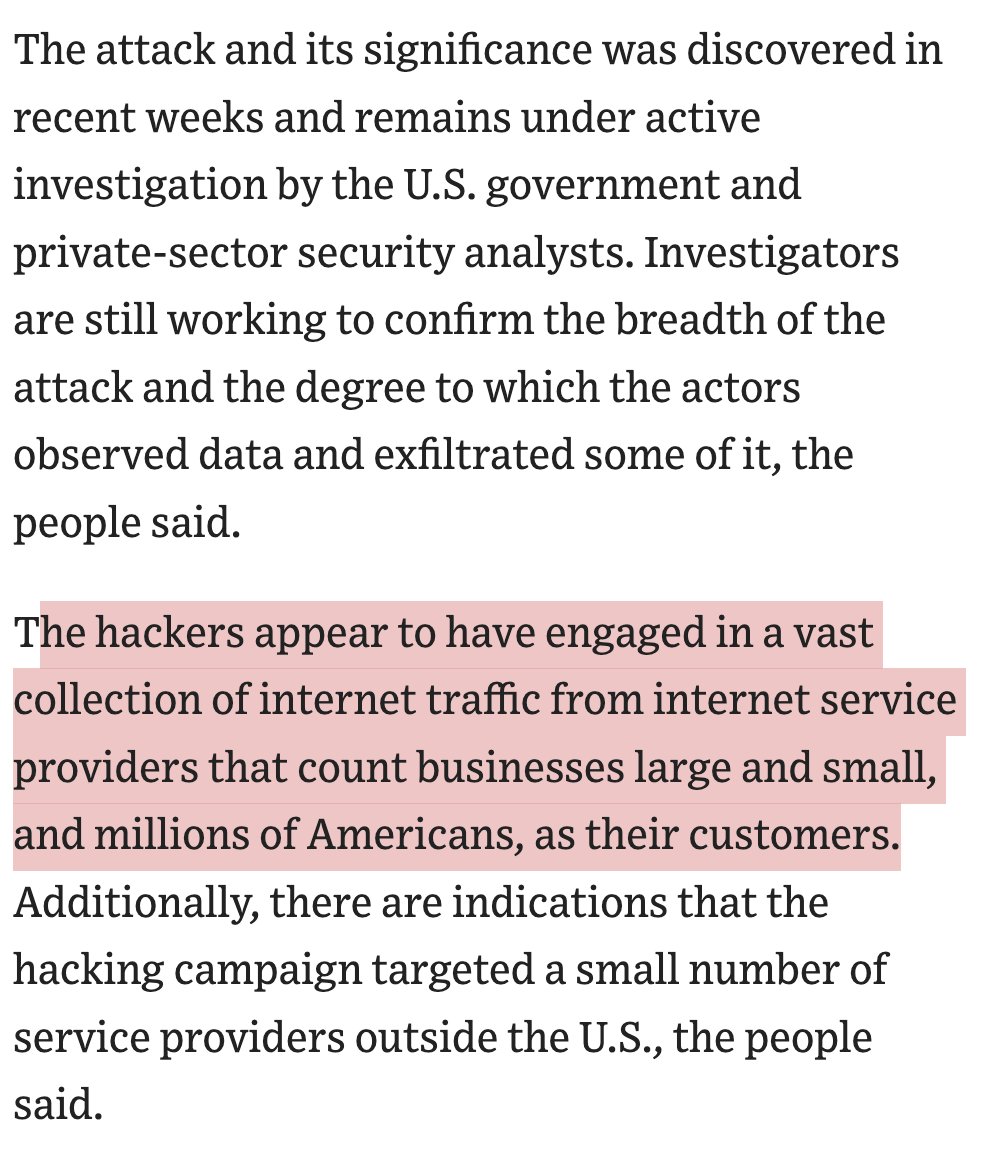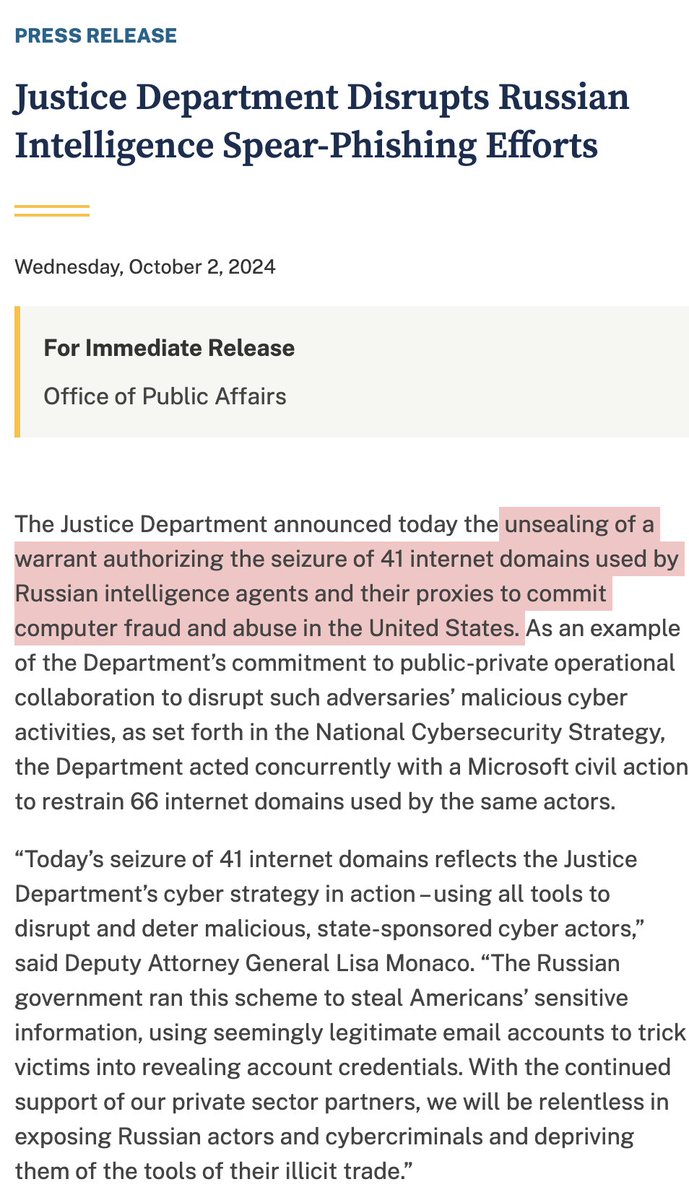CATASTROPHIC: Chinese hackers massively wiretapped 🇺🇸USA by compromising the interception portals mandated under US law.
Remember this the next time a government demands encryption backdoors.
By: @bysarahkrouse @dnvolz @aviswanatha @bobmcmillan h/t @RonDeibert
READ: wsj.com/tech/cybersecu…



Remember this the next time a government demands encryption backdoors.
By: @bysarahkrouse @dnvolz @aviswanatha @bobmcmillan h/t @RonDeibert
READ: wsj.com/tech/cybersecu…




Manufacturers of networking and phone gear must follow specific standards for 'lawful interception' in different jurisdictions (e.g. CALEA & ETSI's standards)
But as we learn time & time again, the scope of potential access & harm almost never matched by efforts to detect & block malicious use.
But as we learn time & time again, the scope of potential access & harm almost never matched by efforts to detect & block malicious use.

There's constant pressure from governments to bake-in systems for access.
Failure to comply with those demands is met with big sanctions. Just look at Durov.
Yet I predict that there will be zero meaningful accountability over this breach.
Failure to comply with those demands is met with big sanctions. Just look at Durov.
Yet I predict that there will be zero meaningful accountability over this breach.
https://x.com/RonDeibert/status/1842557504191930523
When commercial entities build systems that capture or can access mass data, hackers & intelligence services will come for them.
Whether it's for advertising or lawful interception.
They will get breached. It's just a matter of when.

Whether it's for advertising or lawful interception.
They will get breached. It's just a matter of when.
https://x.com/jsrailton/status/1811746146387394643

History note: Remember the 2004-2005 #Greek wiretapping case?
Wiretapping functionality in Vodafone's @ericsson switches was exploited to duplicate Greek gov calsl to prepaid phones, likely by a certain foreign government.
Perhaps #China thought it would be funny to recycle a plot line.
en.wikipedia.org/wiki/Greek_wir…



Wiretapping functionality in Vodafone's @ericsson switches was exploited to duplicate Greek gov calsl to prepaid phones, likely by a certain foreign government.
Perhaps #China thought it would be funny to recycle a plot line.
en.wikipedia.org/wiki/Greek_wir…




The real story of the SALT TYPHOON compromise is one of recklessness & prioritizing access over security again & again.
https://x.com/HostileSpectrum/status/1842589459679715787
We must not keep all our national security eggs in Verizon & ATT's baskets.
Legacy carriers & ISPs keep proving to us that protecting & securing our data is just not a priority.
More encryption in more places & privacy-focused companies are both sorely needed.
Legacy carriers & ISPs keep proving to us that protecting & securing our data is just not a priority.
More encryption in more places & privacy-focused companies are both sorely needed.
Pardon the interruption while every civil liberties advocate points out that they've warned about this for decades👇
Regularly scheduled programming of officials demanding backdoors & making unrealistic promises of safety will return shortly.
Regularly scheduled programming of officials demanding backdoors & making unrealistic promises of safety will return shortly.
https://x.com/KevinBankston/status/1842612926601138282
Personal observation: Anyone else notice that when backdoor hawks leave government... many moderate or shift their positions on surveillance and interception?
I believe that the give us access position with a blindness to downside risk & abuse potential is a side effect of having power. An arrogance of the position.
And when you lose it, the issue reframes towards reality. And the lessons of history.
I believe that the give us access position with a blindness to downside risk & abuse potential is a side effect of having power. An arrogance of the position.
And when you lose it, the issue reframes towards reality. And the lessons of history.
Reflect on the volume of discussion of a TikTok as a national security threat to the US from #China.
At least we've got a choice of whether or not to install it.
Yet with China's compromise of US lawful intercept portals, we're all stuck in that data. No choice.
But I predict no similar outrage or congressional hearings.
At least we've got a choice of whether or not to install it.
Yet with China's compromise of US lawful intercept portals, we're all stuck in that data. No choice.
But I predict no similar outrage or congressional hearings.
• • •
Missing some Tweet in this thread? You can try to
force a refresh































